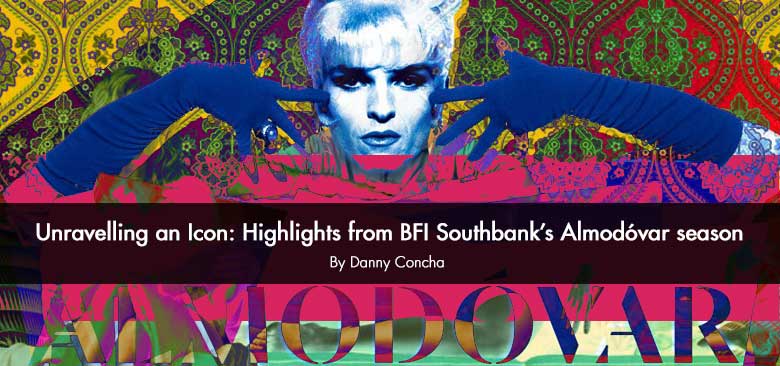As the curtain falls on the BFI Southbank Pedro Almodóvar season, BritEs reflects on some of the highlights. Through this two-month series, coinciding with the international release of Almodóvar’s Oscar-nominated ‘Julieta’ (2016), BFI have brought us closer than ever to the contexts, concepts and realities of the icon behind the lens. With an expansive selection of screenings, guest appearances, lectures and discussions, the British Film Institute have delivered an immersive journey through the remarkable spheres of experience which give shape to the Almodrama we see on screen. This outstanding collaboration of voices, experiences and perspectives will go down as the ultimate tribute to an unforgettable career.
Naturally, the series’ most anticipated event featured the auteur himself with a special UK appearance for ‘Pedro Almodóvar in Conversation’ (12/08/16). Led masterfully by critic Maria Delgado, this in-depth discussion covered vast ground ranging from Almodóvar’s fascination with the colour red to his conflicted relationship with the Catholic Church. Notable points include his comments that staging and set “creates the entire emotional palette of the film”, with his tableaux-esque scenes conjured by three crucial considerations: the walls, the floor and the furniture. Far from incidental, Pedro confesses his “obsession” with ensuring that the wallpaper, carpets and chairs are nothing short of perfect; “I drive my set managers mad”.
Pedro confesses his “obsession” with ensuring that the wallpaper, carpets and chairs are nothing short of perfect; “I drive my set managers mad”.
The occasion also shed light on Almodóvar’s secret weapon… his brother! Sat inconspicuously amongst the audience, Agustín Almodóvar is every inch the unsung hero as Pedro’s dedicated producer and the only actor to appear in every film whether as a postman or policeman, priest or pool attendant. “In Agustín, I have the producer that other directors can only dream of… he enables me to be so free in what I do. I make the films and he takes care of everything else, so I never have to. The first mission for Agustín is always conservation… he defends my creative independence like no one else!”
Whilst his brother helps deliver, it’s his women who inspire. The heartbeat of his films received a dedicated event in the form of ‘High Heels and Nervous Breakdowns: Almodóvar’s Women’ (24/09/16). Continuing Almodóvar’s discussion of the “superhuman strength” of the female influences in his life, BFI set up a panel of speakers to present their favourite protagonists. A compilation of clips dedicated to the late Chus Lampreave, live burlesque performances and an onstage appearance by the eloquent Marisa Paredes reminded us of the sheer power that the female spirit brings to Almodóvar’s films. In Pedro’s words, “if cinema forgets women, it forgets life itself”.
The ‘Almodóvar Connection: Spanish Cinema, History and Memory’ study day (03/09/16) also addressed, amongst other topics, the lingering criticism that his films are out of touch with Spain’s past. The trauma in Iván Zulueta’s harrowing vision of 1970s La Movida counter-culture in ‘Arrebato’ (selected by Pedro as part of the parallel screening programme ‘In Almodóvar’s Words…’) jars with the kitsch and colourful ‘Pepe Luci y Bom’ of the same year. Such opposing perspectives suggest that Almodóvar ignores the “dark heart of La Movida”. Yet, according to speaker Alberto Mira, “Pedro and his work are intentionally bound up in fantasy… rather than indulging in socio-policital commentary, he looks to celebrate an optimistic and larger-than-life imagination of the world”.
Whilst some may take issue with a director who claims to “make films as if Franco never existed”, it is precisely this unorthodoxy which put him on the map. Standing out from the generation of retrospective post-Franco filmmakers, Pedro projects a progressive vision of the future with a transgressive, deviant and provocative imagination that never ceases to entertain. From his colours to his women and right up to his world-view, Almodóvar is looking to the next step.

